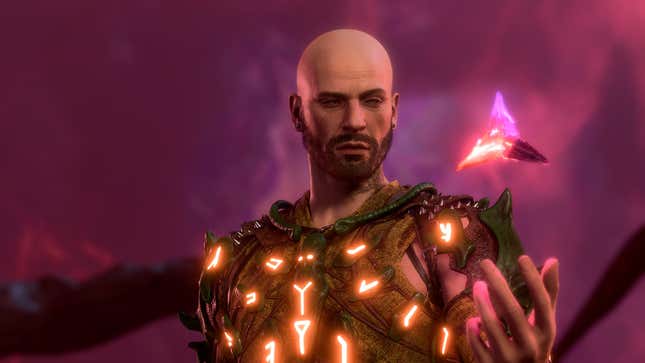I adored the Baldur’s Gate 3 ending I got. It definitely felt a bit rushed in its efforts to wrap up several plot lines at once, but I was pretty happy with where my character ended up and the direction his relationships went, or were implied to go. However, it was all contingent on me making what is arguably the “good” decision at the end, rather than the “evil,” frankly reprehensible one. Naturally, I was curious about how Baldur’s Gate 3 would tie up all those loose ends if you chose to take the path of the tyrant. Unfortunately, in a game that is often so reactive to your decisions and actions, Baldur’s Gate 3’s evil ending feels like one of the most undercooked aspects of its finale, and I hope that if developer Larian Studios is going to keep making changes to the game’s epilogue, that this ending gets a little love in the future.
It’s impossible to talk about the issues with this ending in any real way, however, without discussing Baldur’s Gate 3’s conclusion in detail, so turn away now if you’re not ready to read about what the party faces in the game’s big climax.

To set the stage, the ending of Baldur’s Gate 3 has your team facing the Netherbrain, a giant, sentient brain that commands the Mind Flayers to descend upon Faerûn, abduct civilians, and infect them with tadpoles that forcibly transform them into more of their squid-like alien species. This has been the threat lingering over your group since you woke up on a Mind Flayer ship at the beginning of the game, and everything has brought you to this point where, using the Netherstones you took from its lackeys, you can subdue the Netherbrain and destroy it, along with the tadpoles in your heads. Or, you can do something else. Something more vile.
The other option in Baldur’s Gate 3’s ending is to control the Netherbrain, and through it, everyone who has a tadpole in their head. Doing this requires you to betray your party, and depending on the way you choose to go about it, you may have to straight-up murder an allied Mind Flayer to get the Netherstones you need to pull this off. Your party is shocked and asks what the hell you’re doing, and you then proceed to mind-control them and the rest of the Illithid forces, then sit on a throne as you reign over Faerûn. Your brainwashed allies cheer you on as you smirk over the chaos below. It’s one of the most truly evil moments in a game that gives you a lot of opportunities to be a real bastard, but it also feels like such an out-of-left-field development for most versions of the player character that it’s hard to reconcile. But that’s part of playing evil playthroughs, I suppose.

If you’re playing a Dark Urge character, I could see Baldur’s Gate 3 leading down this path. The violent origin character, who is plagued by thoughts of carnage and sadism, learns through their story that they come from Bhaal, the Lord of Murder, and part of choosing that character is choosing the path of either resisting or giving into your impulses to do harm to others. So if you were choosing to just revel in these actions, I could see that character making the evil choice. But for most other variations of a Baldur’s Gate 3 protagonist, the option feels so out of pocket that I would be interested to hear how anyone role plays into it. Perhaps they gradually used Illithid powers and upgrades and were drawn to their power? It definitely feels like an ending that has player-imposed foreshadowing, but it feels like a game-long investment of small decisions leading to one, explosive final betrayal of your humanity (or whatever race you chose to play).
All that being said, the choice is so vile you would think it would offer something worthwhile to see after you make it. But the game lasts for only a few more seconds before it abruptly ends with your character smugly looking over their new empire and then it cuts to black. Without any true epilogue to this ending, it feels like a choice for choice’s sake. It posits a vague notion of power the player might want, without much concrete explanation as to what they would do with it. On its face, I don’t mind that because ending a choice-driven game without painstakingly telling you what everyone went on to do allows for some internalized roleplaying (Mass Effect 3’s original ending had it right, fight me), but compared to the other decision, which gives a (perhaps rushed) check-in on characters and what they’re going to be doing after the events, the evil ending feels like an afterthought. Sure, there’s no version of this ending that has a feel-good closer like Gale proposing to me in my ending, but something that contextualized what controlling the Illithid army even entails would’ve gone a long way.
Larian Studios has already said it knows Baldur’s Gate 3’s ending is lacking, and is making changes to things like adding a new scene for Karlach to flesh things out. I don’t know if the evil ending is on the team’s list of things to expand upon, but it would go a long way to making it feel like a worthwhile path to take, rather than an intrusive thought to act upon because it shows up in your dialogue options.
























